Taxation Law Assignment: Income Tax, Deductions, and Business Analysis
VerifiedAdded on 2021/05/31
|11
|3868
|429
Homework Assignment
AI Summary
This taxation law assignment addresses three key questions related to income tax, deductions, and business activities. The first question examines whether income received by a person for narrating the story of her husband is assessable under the ITAA 1997, considering ordinary income concepts. The second question analyzes whether a taxpayer is eligible for deductions for child day care expenses under section 8-1 of the ITAA 1997, evaluating the nature of the expenditure. The final question explores whether actions constitute the execution of a business and whether earnings from an isolated business are taxable under section 25(1) of the ITAA 1936. The assignment applies relevant laws, including the ITAA, and case precedents like Scott v Commissioner of Taxation and Lunney v Federal Commissioner of Taxation, to provide detailed answers and conclusions for each issue.
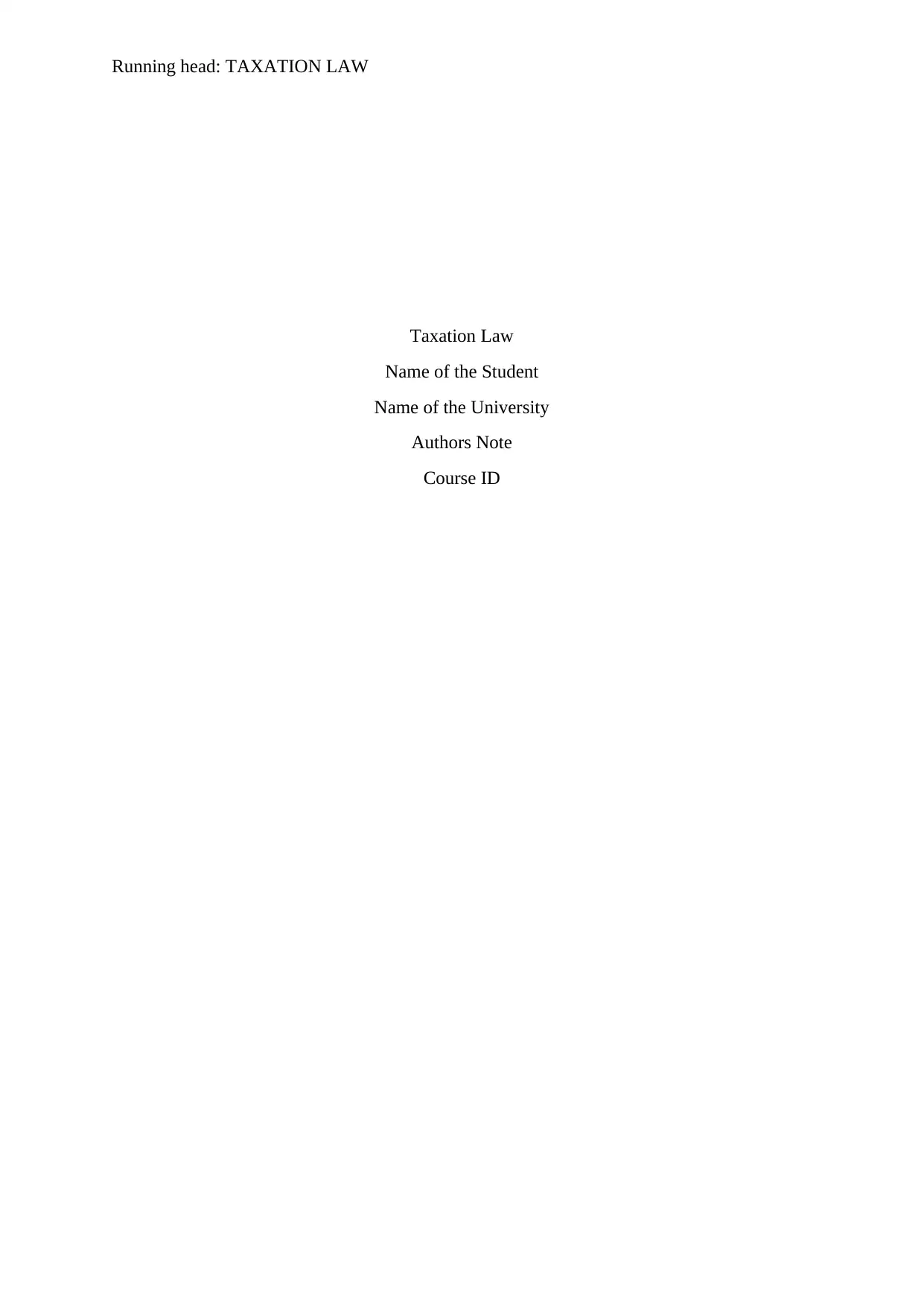
Running head: TAXATION LAW
Taxation Law
Name of the Student
Name of the University
Authors Note
Course ID
Taxation Law
Name of the Student
Name of the University
Authors Note
Course ID
Paraphrase This Document
Need a fresh take? Get an instant paraphrase of this document with our AI Paraphraser
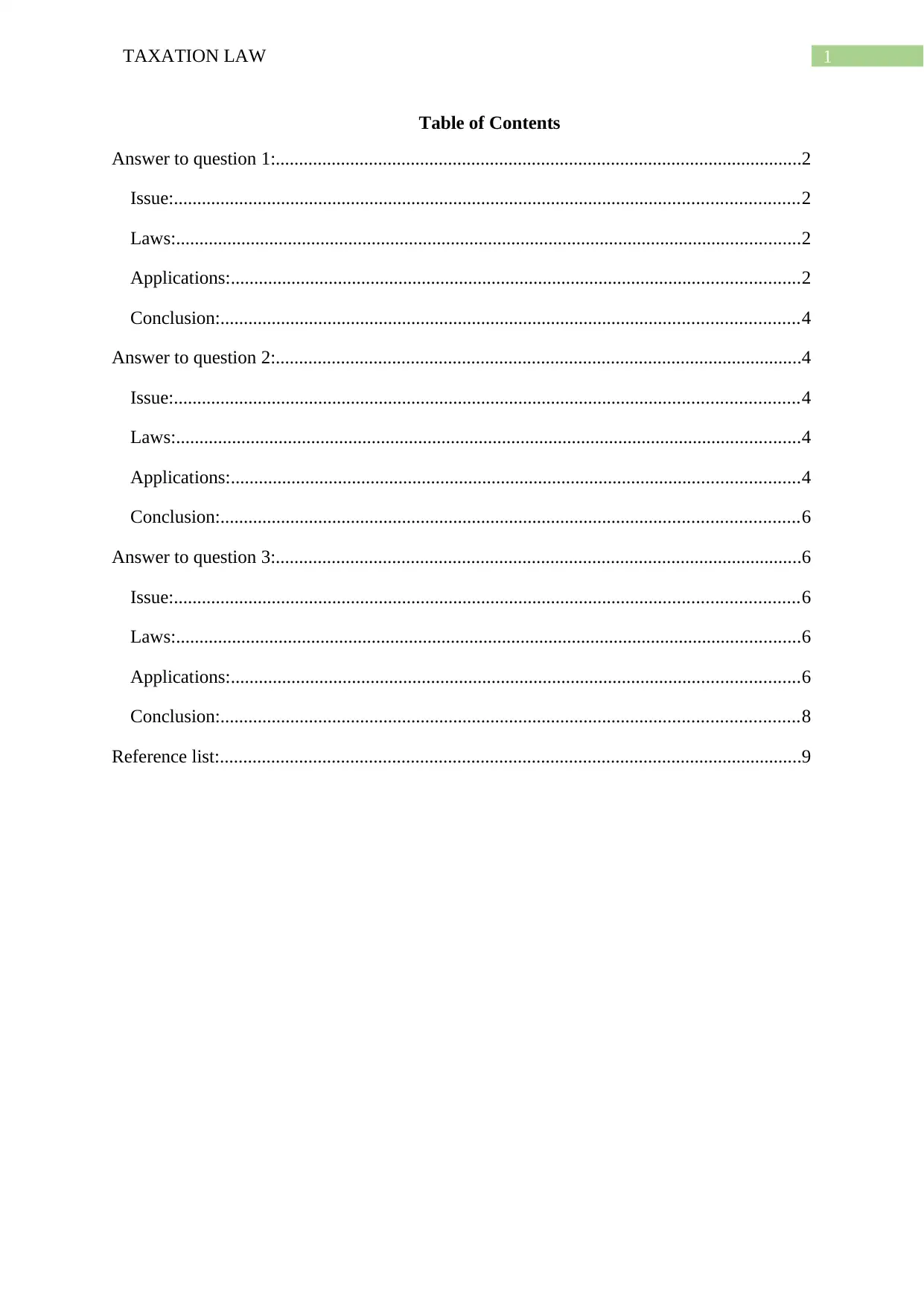
1TAXATION LAW
Table of Contents
Answer to question 1:.................................................................................................................2
Issue:......................................................................................................................................2
Laws:......................................................................................................................................2
Applications:..........................................................................................................................2
Conclusion:............................................................................................................................4
Answer to question 2:.................................................................................................................4
Issue:......................................................................................................................................4
Laws:......................................................................................................................................4
Applications:..........................................................................................................................4
Conclusion:............................................................................................................................6
Answer to question 3:.................................................................................................................6
Issue:......................................................................................................................................6
Laws:......................................................................................................................................6
Applications:..........................................................................................................................6
Conclusion:............................................................................................................................8
Reference list:.............................................................................................................................9
Table of Contents
Answer to question 1:.................................................................................................................2
Issue:......................................................................................................................................2
Laws:......................................................................................................................................2
Applications:..........................................................................................................................2
Conclusion:............................................................................................................................4
Answer to question 2:.................................................................................................................4
Issue:......................................................................................................................................4
Laws:......................................................................................................................................4
Applications:..........................................................................................................................4
Conclusion:............................................................................................................................6
Answer to question 3:.................................................................................................................6
Issue:......................................................................................................................................6
Laws:......................................................................................................................................6
Applications:..........................................................................................................................6
Conclusion:............................................................................................................................8
Reference list:.............................................................................................................................9
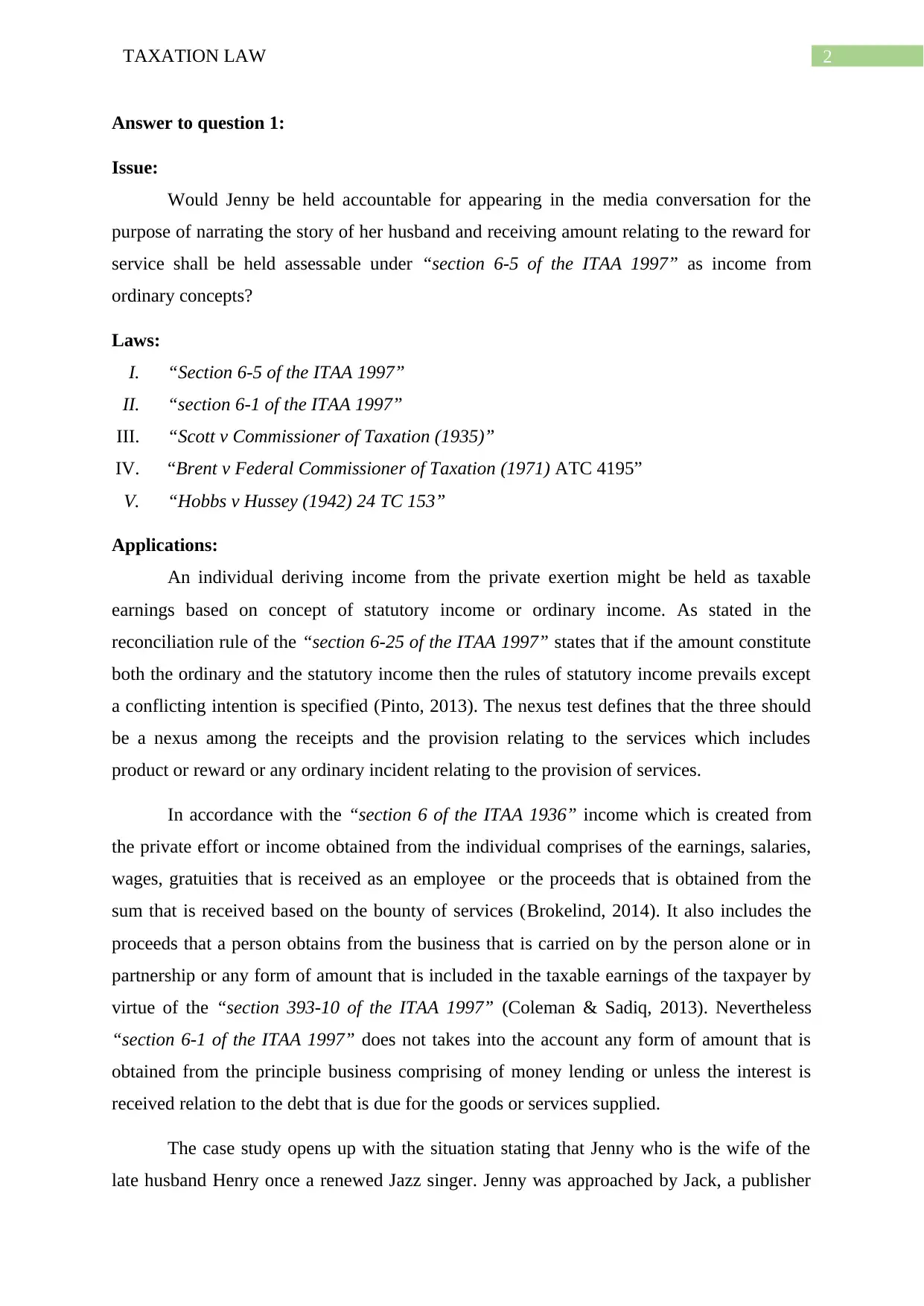
2TAXATION LAW
Answer to question 1:
Issue:
Would Jenny be held accountable for appearing in the media conversation for the
purpose of narrating the story of her husband and receiving amount relating to the reward for
service shall be held assessable under “section 6-5 of the ITAA 1997” as income from
ordinary concepts?
Laws:
I. “Section 6-5 of the ITAA 1997”
II. “section 6-1 of the ITAA 1997”
III. “Scott v Commissioner of Taxation (1935)”
IV. “Brent v Federal Commissioner of Taxation (1971) ATC 4195”
V. “Hobbs v Hussey (1942) 24 TC 153”
Applications:
An individual deriving income from the private exertion might be held as taxable
earnings based on concept of statutory income or ordinary income. As stated in the
reconciliation rule of the “section 6-25 of the ITAA 1997” states that if the amount constitute
both the ordinary and the statutory income then the rules of statutory income prevails except
a conflicting intention is specified (Pinto, 2013). The nexus test defines that the three should
be a nexus among the receipts and the provision relating to the services which includes
product or reward or any ordinary incident relating to the provision of services.
In accordance with the “section 6 of the ITAA 1936” income which is created from
the private effort or income obtained from the individual comprises of the earnings, salaries,
wages, gratuities that is received as an employee or the proceeds that is obtained from the
sum that is received based on the bounty of services (Brokelind, 2014). It also includes the
proceeds that a person obtains from the business that is carried on by the person alone or in
partnership or any form of amount that is included in the taxable earnings of the taxpayer by
virtue of the “section 393-10 of the ITAA 1997” (Coleman & Sadiq, 2013). Nevertheless
“section 6-1 of the ITAA 1997” does not takes into the account any form of amount that is
obtained from the principle business comprising of money lending or unless the interest is
received relation to the debt that is due for the goods or services supplied.
The case study opens up with the situation stating that Jenny who is the wife of the
late husband Henry once a renewed Jazz singer. Jenny was approached by Jack, a publisher
Answer to question 1:
Issue:
Would Jenny be held accountable for appearing in the media conversation for the
purpose of narrating the story of her husband and receiving amount relating to the reward for
service shall be held assessable under “section 6-5 of the ITAA 1997” as income from
ordinary concepts?
Laws:
I. “Section 6-5 of the ITAA 1997”
II. “section 6-1 of the ITAA 1997”
III. “Scott v Commissioner of Taxation (1935)”
IV. “Brent v Federal Commissioner of Taxation (1971) ATC 4195”
V. “Hobbs v Hussey (1942) 24 TC 153”
Applications:
An individual deriving income from the private exertion might be held as taxable
earnings based on concept of statutory income or ordinary income. As stated in the
reconciliation rule of the “section 6-25 of the ITAA 1997” states that if the amount constitute
both the ordinary and the statutory income then the rules of statutory income prevails except
a conflicting intention is specified (Pinto, 2013). The nexus test defines that the three should
be a nexus among the receipts and the provision relating to the services which includes
product or reward or any ordinary incident relating to the provision of services.
In accordance with the “section 6 of the ITAA 1936” income which is created from
the private effort or income obtained from the individual comprises of the earnings, salaries,
wages, gratuities that is received as an employee or the proceeds that is obtained from the
sum that is received based on the bounty of services (Brokelind, 2014). It also includes the
proceeds that a person obtains from the business that is carried on by the person alone or in
partnership or any form of amount that is included in the taxable earnings of the taxpayer by
virtue of the “section 393-10 of the ITAA 1997” (Coleman & Sadiq, 2013). Nevertheless
“section 6-1 of the ITAA 1997” does not takes into the account any form of amount that is
obtained from the principle business comprising of money lending or unless the interest is
received relation to the debt that is due for the goods or services supplied.
The case study opens up with the situation stating that Jenny who is the wife of the
late husband Henry once a renewed Jazz singer. Jenny was approached by Jack, a publisher
⊘ This is a preview!⊘
Do you want full access?
Subscribe today to unlock all pages.

Trusted by 1+ million students worldwide
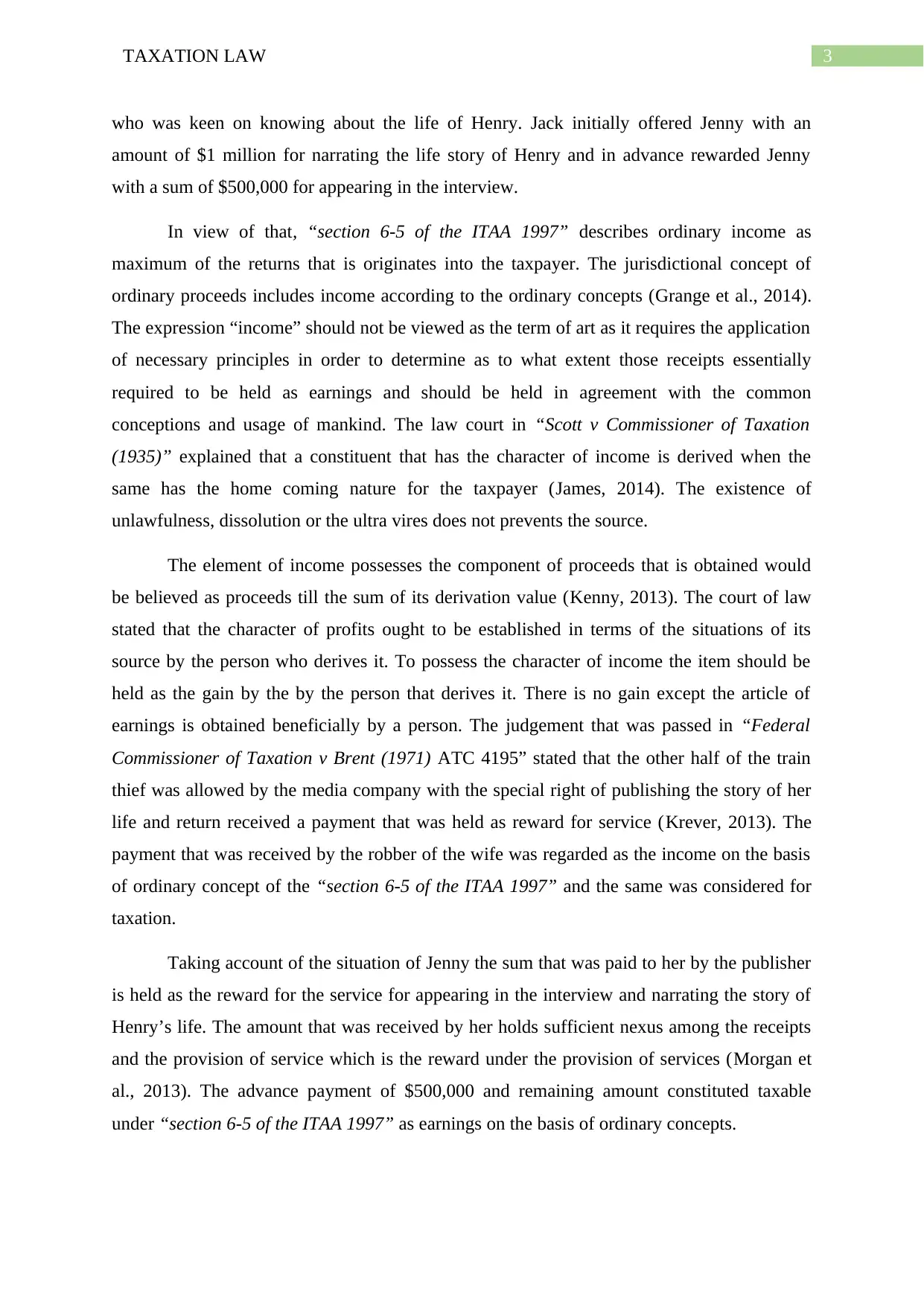
3TAXATION LAW
who was keen on knowing about the life of Henry. Jack initially offered Jenny with an
amount of $1 million for narrating the life story of Henry and in advance rewarded Jenny
with a sum of $500,000 for appearing in the interview.
In view of that, “section 6-5 of the ITAA 1997” describes ordinary income as
maximum of the returns that is originates into the taxpayer. The jurisdictional concept of
ordinary proceeds includes income according to the ordinary concepts (Grange et al., 2014).
The expression “income” should not be viewed as the term of art as it requires the application
of necessary principles in order to determine as to what extent those receipts essentially
required to be held as earnings and should be held in agreement with the common
conceptions and usage of mankind. The law court in “Scott v Commissioner of Taxation
(1935)” explained that a constituent that has the character of income is derived when the
same has the home coming nature for the taxpayer (James, 2014). The existence of
unlawfulness, dissolution or the ultra vires does not prevents the source.
The element of income possesses the component of proceeds that is obtained would
be believed as proceeds till the sum of its derivation value (Kenny, 2013). The court of law
stated that the character of profits ought to be established in terms of the situations of its
source by the person who derives it. To possess the character of income the item should be
held as the gain by the by the person that derives it. There is no gain except the article of
earnings is obtained beneficially by a person. The judgement that was passed in “Federal
Commissioner of Taxation v Brent (1971) ATC 4195” stated that the other half of the train
thief was allowed by the media company with the special right of publishing the story of her
life and return received a payment that was held as reward for service (Krever, 2013). The
payment that was received by the robber of the wife was regarded as the income on the basis
of ordinary concept of the “section 6-5 of the ITAA 1997” and the same was considered for
taxation.
Taking account of the situation of Jenny the sum that was paid to her by the publisher
is held as the reward for the service for appearing in the interview and narrating the story of
Henry’s life. The amount that was received by her holds sufficient nexus among the receipts
and the provision of service which is the reward under the provision of services (Morgan et
al., 2013). The advance payment of $500,000 and remaining amount constituted taxable
under “section 6-5 of the ITAA 1997” as earnings on the basis of ordinary concepts.
who was keen on knowing about the life of Henry. Jack initially offered Jenny with an
amount of $1 million for narrating the life story of Henry and in advance rewarded Jenny
with a sum of $500,000 for appearing in the interview.
In view of that, “section 6-5 of the ITAA 1997” describes ordinary income as
maximum of the returns that is originates into the taxpayer. The jurisdictional concept of
ordinary proceeds includes income according to the ordinary concepts (Grange et al., 2014).
The expression “income” should not be viewed as the term of art as it requires the application
of necessary principles in order to determine as to what extent those receipts essentially
required to be held as earnings and should be held in agreement with the common
conceptions and usage of mankind. The law court in “Scott v Commissioner of Taxation
(1935)” explained that a constituent that has the character of income is derived when the
same has the home coming nature for the taxpayer (James, 2014). The existence of
unlawfulness, dissolution or the ultra vires does not prevents the source.
The element of income possesses the component of proceeds that is obtained would
be believed as proceeds till the sum of its derivation value (Kenny, 2013). The court of law
stated that the character of profits ought to be established in terms of the situations of its
source by the person who derives it. To possess the character of income the item should be
held as the gain by the by the person that derives it. There is no gain except the article of
earnings is obtained beneficially by a person. The judgement that was passed in “Federal
Commissioner of Taxation v Brent (1971) ATC 4195” stated that the other half of the train
thief was allowed by the media company with the special right of publishing the story of her
life and return received a payment that was held as reward for service (Krever, 2013). The
payment that was received by the robber of the wife was regarded as the income on the basis
of ordinary concept of the “section 6-5 of the ITAA 1997” and the same was considered for
taxation.
Taking account of the situation of Jenny the sum that was paid to her by the publisher
is held as the reward for the service for appearing in the interview and narrating the story of
Henry’s life. The amount that was received by her holds sufficient nexus among the receipts
and the provision of service which is the reward under the provision of services (Morgan et
al., 2013). The advance payment of $500,000 and remaining amount constituted taxable
under “section 6-5 of the ITAA 1997” as earnings on the basis of ordinary concepts.
Paraphrase This Document
Need a fresh take? Get an instant paraphrase of this document with our AI Paraphraser
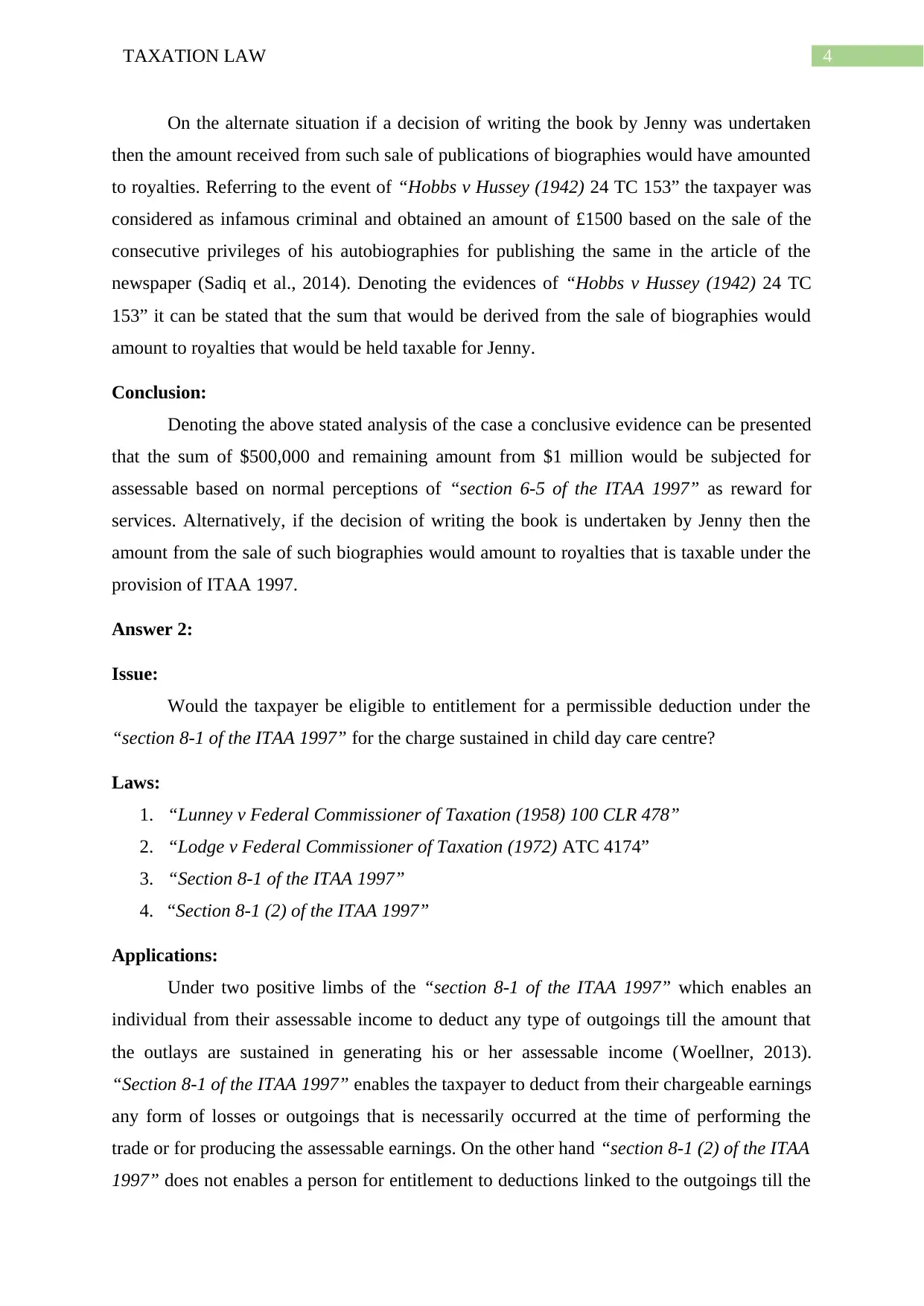
4TAXATION LAW
On the alternate situation if a decision of writing the book by Jenny was undertaken
then the amount received from such sale of publications of biographies would have amounted
to royalties. Referring to the event of “Hobbs v Hussey (1942) 24 TC 153” the taxpayer was
considered as infamous criminal and obtained an amount of £1500 based on the sale of the
consecutive privileges of his autobiographies for publishing the same in the article of the
newspaper (Sadiq et al., 2014). Denoting the evidences of “Hobbs v Hussey (1942) 24 TC
153” it can be stated that the sum that would be derived from the sale of biographies would
amount to royalties that would be held taxable for Jenny.
Conclusion:
Denoting the above stated analysis of the case a conclusive evidence can be presented
that the sum of $500,000 and remaining amount from $1 million would be subjected for
assessable based on normal perceptions of “section 6-5 of the ITAA 1997” as reward for
services. Alternatively, if the decision of writing the book is undertaken by Jenny then the
amount from the sale of such biographies would amount to royalties that is taxable under the
provision of ITAA 1997.
Answer 2:
Issue:
Would the taxpayer be eligible to entitlement for a permissible deduction under the
“section 8-1 of the ITAA 1997” for the charge sustained in child day care centre?
Laws:
1. “Lunney v Federal Commissioner of Taxation (1958) 100 CLR 478”
2. “Lodge v Federal Commissioner of Taxation (1972) ATC 4174”
3. “Section 8-1 of the ITAA 1997”
4. “Section 8-1 (2) of the ITAA 1997”
Applications:
Under two positive limbs of the “section 8-1 of the ITAA 1997” which enables an
individual from their assessable income to deduct any type of outgoings till the amount that
the outlays are sustained in generating his or her assessable income (Woellner, 2013).
“Section 8-1 of the ITAA 1997” enables the taxpayer to deduct from their chargeable earnings
any form of losses or outgoings that is necessarily occurred at the time of performing the
trade or for producing the assessable earnings. On the other hand “section 8-1 (2) of the ITAA
1997” does not enables a person for entitlement to deductions linked to the outgoings till the
On the alternate situation if a decision of writing the book by Jenny was undertaken
then the amount received from such sale of publications of biographies would have amounted
to royalties. Referring to the event of “Hobbs v Hussey (1942) 24 TC 153” the taxpayer was
considered as infamous criminal and obtained an amount of £1500 based on the sale of the
consecutive privileges of his autobiographies for publishing the same in the article of the
newspaper (Sadiq et al., 2014). Denoting the evidences of “Hobbs v Hussey (1942) 24 TC
153” it can be stated that the sum that would be derived from the sale of biographies would
amount to royalties that would be held taxable for Jenny.
Conclusion:
Denoting the above stated analysis of the case a conclusive evidence can be presented
that the sum of $500,000 and remaining amount from $1 million would be subjected for
assessable based on normal perceptions of “section 6-5 of the ITAA 1997” as reward for
services. Alternatively, if the decision of writing the book is undertaken by Jenny then the
amount from the sale of such biographies would amount to royalties that is taxable under the
provision of ITAA 1997.
Answer 2:
Issue:
Would the taxpayer be eligible to entitlement for a permissible deduction under the
“section 8-1 of the ITAA 1997” for the charge sustained in child day care centre?
Laws:
1. “Lunney v Federal Commissioner of Taxation (1958) 100 CLR 478”
2. “Lodge v Federal Commissioner of Taxation (1972) ATC 4174”
3. “Section 8-1 of the ITAA 1997”
4. “Section 8-1 (2) of the ITAA 1997”
Applications:
Under two positive limbs of the “section 8-1 of the ITAA 1997” which enables an
individual from their assessable income to deduct any type of outgoings till the amount that
the outlays are sustained in generating his or her assessable income (Woellner, 2013).
“Section 8-1 of the ITAA 1997” enables the taxpayer to deduct from their chargeable earnings
any form of losses or outgoings that is necessarily occurred at the time of performing the
trade or for producing the assessable earnings. On the other hand “section 8-1 (2) of the ITAA
1997” does not enables a person for entitlement to deductions linked to the outgoings till the
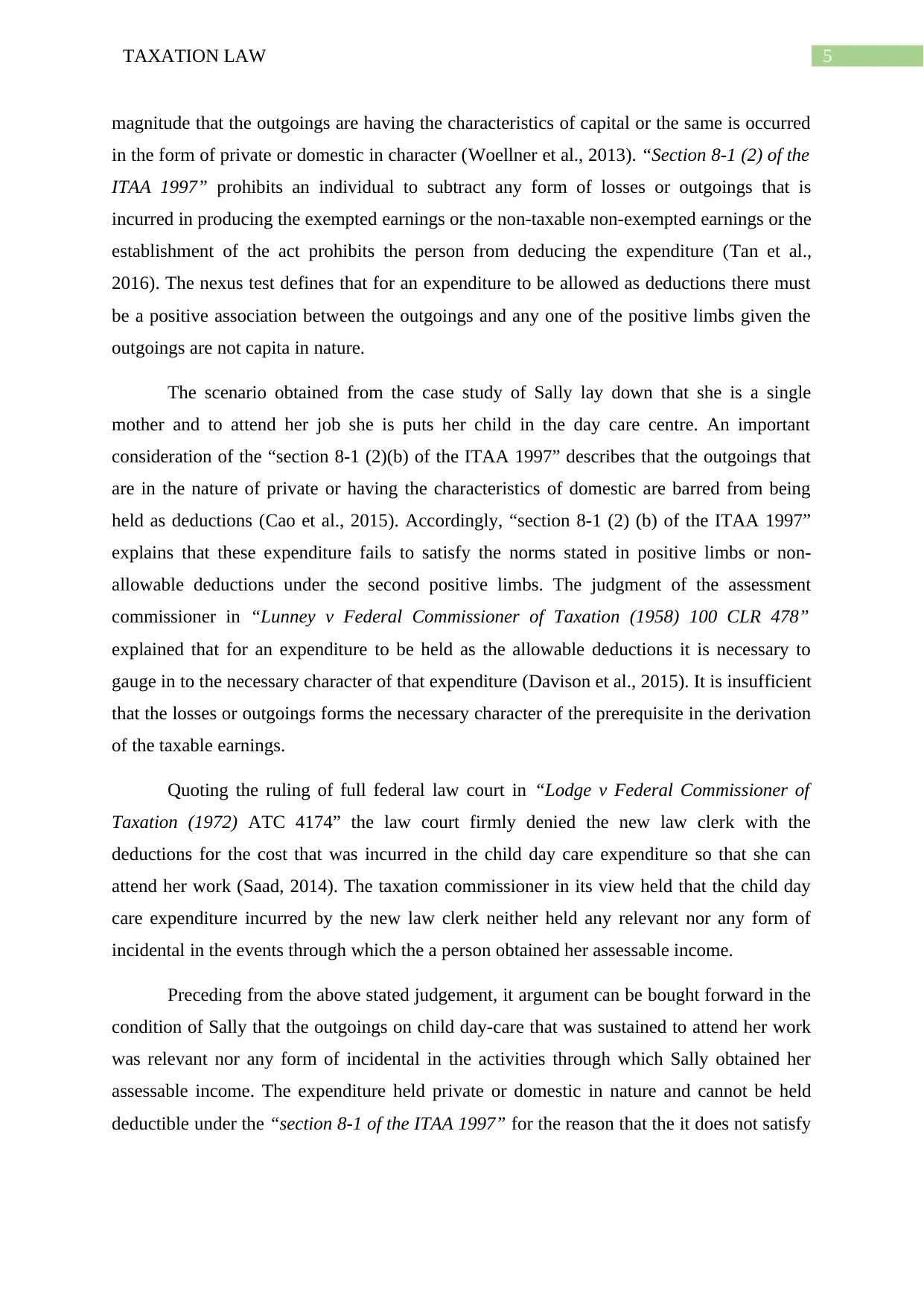
5TAXATION LAW
magnitude that the outgoings are having the characteristics of capital or the same is occurred
in the form of private or domestic in character (Woellner et al., 2013). “Section 8-1 (2) of the
ITAA 1997” prohibits an individual to subtract any form of losses or outgoings that is
incurred in producing the exempted earnings or the non-taxable non-exempted earnings or the
establishment of the act prohibits the person from deducing the expenditure (Tan et al.,
2016). The nexus test defines that for an expenditure to be allowed as deductions there must
be a positive association between the outgoings and any one of the positive limbs given the
outgoings are not capita in nature.
The scenario obtained from the case study of Sally lay down that she is a single
mother and to attend her job she is puts her child in the day care centre. An important
consideration of the “section 8-1 (2)(b) of the ITAA 1997” describes that the outgoings that
are in the nature of private or having the characteristics of domestic are barred from being
held as deductions (Cao et al., 2015). Accordingly, “section 8-1 (2) (b) of the ITAA 1997”
explains that these expenditure fails to satisfy the norms stated in positive limbs or non-
allowable deductions under the second positive limbs. The judgment of the assessment
commissioner in “Lunney v Federal Commissioner of Taxation (1958) 100 CLR 478”
explained that for an expenditure to be held as the allowable deductions it is necessary to
gauge in to the necessary character of that expenditure (Davison et al., 2015). It is insufficient
that the losses or outgoings forms the necessary character of the prerequisite in the derivation
of the taxable earnings.
Quoting the ruling of full federal law court in “Lodge v Federal Commissioner of
Taxation (1972) ATC 4174” the law court firmly denied the new law clerk with the
deductions for the cost that was incurred in the child day care expenditure so that she can
attend her work (Saad, 2014). The taxation commissioner in its view held that the child day
care expenditure incurred by the new law clerk neither held any relevant nor any form of
incidental in the events through which the a person obtained her assessable income.
Preceding from the above stated judgement, it argument can be bought forward in the
condition of Sally that the outgoings on child day-care that was sustained to attend her work
was relevant nor any form of incidental in the activities through which Sally obtained her
assessable income. The expenditure held private or domestic in nature and cannot be held
deductible under the “section 8-1 of the ITAA 1997” for the reason that the it does not satisfy
magnitude that the outgoings are having the characteristics of capital or the same is occurred
in the form of private or domestic in character (Woellner et al., 2013). “Section 8-1 (2) of the
ITAA 1997” prohibits an individual to subtract any form of losses or outgoings that is
incurred in producing the exempted earnings or the non-taxable non-exempted earnings or the
establishment of the act prohibits the person from deducing the expenditure (Tan et al.,
2016). The nexus test defines that for an expenditure to be allowed as deductions there must
be a positive association between the outgoings and any one of the positive limbs given the
outgoings are not capita in nature.
The scenario obtained from the case study of Sally lay down that she is a single
mother and to attend her job she is puts her child in the day care centre. An important
consideration of the “section 8-1 (2)(b) of the ITAA 1997” describes that the outgoings that
are in the nature of private or having the characteristics of domestic are barred from being
held as deductions (Cao et al., 2015). Accordingly, “section 8-1 (2) (b) of the ITAA 1997”
explains that these expenditure fails to satisfy the norms stated in positive limbs or non-
allowable deductions under the second positive limbs. The judgment of the assessment
commissioner in “Lunney v Federal Commissioner of Taxation (1958) 100 CLR 478”
explained that for an expenditure to be held as the allowable deductions it is necessary to
gauge in to the necessary character of that expenditure (Davison et al., 2015). It is insufficient
that the losses or outgoings forms the necessary character of the prerequisite in the derivation
of the taxable earnings.
Quoting the ruling of full federal law court in “Lodge v Federal Commissioner of
Taxation (1972) ATC 4174” the law court firmly denied the new law clerk with the
deductions for the cost that was incurred in the child day care expenditure so that she can
attend her work (Saad, 2014). The taxation commissioner in its view held that the child day
care expenditure incurred by the new law clerk neither held any relevant nor any form of
incidental in the events through which the a person obtained her assessable income.
Preceding from the above stated judgement, it argument can be bought forward in the
condition of Sally that the outgoings on child day-care that was sustained to attend her work
was relevant nor any form of incidental in the activities through which Sally obtained her
assessable income. The expenditure held private or domestic in nature and cannot be held
deductible under the “section 8-1 of the ITAA 1997” for the reason that the it does not satisfy
⊘ This is a preview!⊘
Do you want full access?
Subscribe today to unlock all pages.

Trusted by 1+ million students worldwide
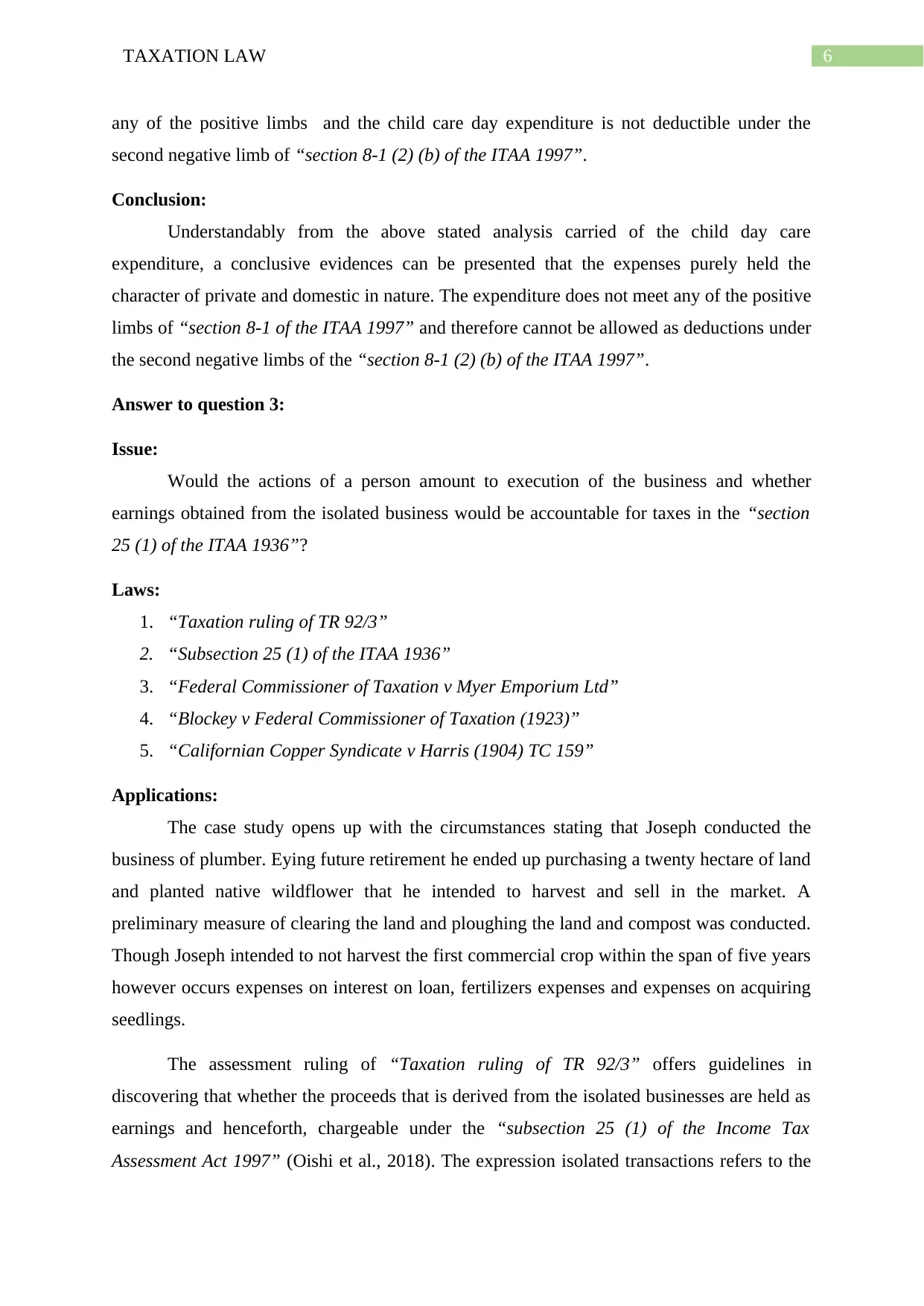
6TAXATION LAW
any of the positive limbs and the child care day expenditure is not deductible under the
second negative limb of “section 8-1 (2) (b) of the ITAA 1997”.
Conclusion:
Understandably from the above stated analysis carried of the child day care
expenditure, a conclusive evidences can be presented that the expenses purely held the
character of private and domestic in nature. The expenditure does not meet any of the positive
limbs of “section 8-1 of the ITAA 1997” and therefore cannot be allowed as deductions under
the second negative limbs of the “section 8-1 (2) (b) of the ITAA 1997”.
Answer to question 3:
Issue:
Would the actions of a person amount to execution of the business and whether
earnings obtained from the isolated business would be accountable for taxes in the “section
25 (1) of the ITAA 1936”?
Laws:
1. “Taxation ruling of TR 92/3”
2. “Subsection 25 (1) of the ITAA 1936”
3. “Federal Commissioner of Taxation v Myer Emporium Ltd”
4. “Blockey v Federal Commissioner of Taxation (1923)”
5. “Californian Copper Syndicate v Harris (1904) TC 159”
Applications:
The case study opens up with the circumstances stating that Joseph conducted the
business of plumber. Eying future retirement he ended up purchasing a twenty hectare of land
and planted native wildflower that he intended to harvest and sell in the market. A
preliminary measure of clearing the land and ploughing the land and compost was conducted.
Though Joseph intended to not harvest the first commercial crop within the span of five years
however occurs expenses on interest on loan, fertilizers expenses and expenses on acquiring
seedlings.
The assessment ruling of “Taxation ruling of TR 92/3” offers guidelines in
discovering that whether the proceeds that is derived from the isolated businesses are held as
earnings and henceforth, chargeable under the “subsection 25 (1) of the Income Tax
Assessment Act 1997” (Oishi et al., 2018). The expression isolated transactions refers to the
any of the positive limbs and the child care day expenditure is not deductible under the
second negative limb of “section 8-1 (2) (b) of the ITAA 1997”.
Conclusion:
Understandably from the above stated analysis carried of the child day care
expenditure, a conclusive evidences can be presented that the expenses purely held the
character of private and domestic in nature. The expenditure does not meet any of the positive
limbs of “section 8-1 of the ITAA 1997” and therefore cannot be allowed as deductions under
the second negative limbs of the “section 8-1 (2) (b) of the ITAA 1997”.
Answer to question 3:
Issue:
Would the actions of a person amount to execution of the business and whether
earnings obtained from the isolated business would be accountable for taxes in the “section
25 (1) of the ITAA 1936”?
Laws:
1. “Taxation ruling of TR 92/3”
2. “Subsection 25 (1) of the ITAA 1936”
3. “Federal Commissioner of Taxation v Myer Emporium Ltd”
4. “Blockey v Federal Commissioner of Taxation (1923)”
5. “Californian Copper Syndicate v Harris (1904) TC 159”
Applications:
The case study opens up with the circumstances stating that Joseph conducted the
business of plumber. Eying future retirement he ended up purchasing a twenty hectare of land
and planted native wildflower that he intended to harvest and sell in the market. A
preliminary measure of clearing the land and ploughing the land and compost was conducted.
Though Joseph intended to not harvest the first commercial crop within the span of five years
however occurs expenses on interest on loan, fertilizers expenses and expenses on acquiring
seedlings.
The assessment ruling of “Taxation ruling of TR 92/3” offers guidelines in
discovering that whether the proceeds that is derived from the isolated businesses are held as
earnings and henceforth, chargeable under the “subsection 25 (1) of the Income Tax
Assessment Act 1997” (Oishi et al., 2018). The expression isolated transactions refers to the
Paraphrase This Document
Need a fresh take? Get an instant paraphrase of this document with our AI Paraphraser
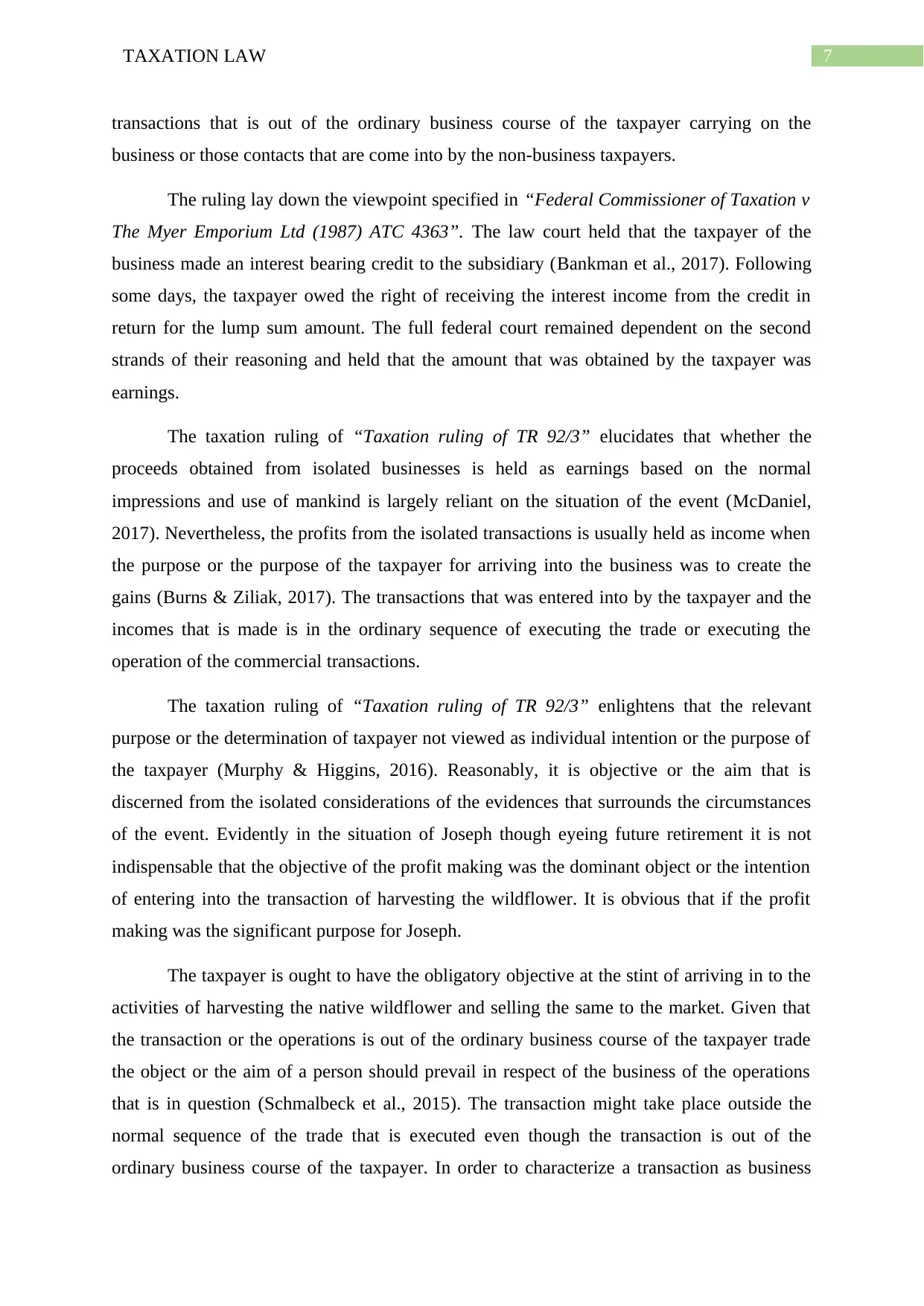
7TAXATION LAW
transactions that is out of the ordinary business course of the taxpayer carrying on the
business or those contacts that are come into by the non-business taxpayers.
The ruling lay down the viewpoint specified in “Federal Commissioner of Taxation v
The Myer Emporium Ltd (1987) ATC 4363”. The law court held that the taxpayer of the
business made an interest bearing credit to the subsidiary (Bankman et al., 2017). Following
some days, the taxpayer owed the right of receiving the interest income from the credit in
return for the lump sum amount. The full federal court remained dependent on the second
strands of their reasoning and held that the amount that was obtained by the taxpayer was
earnings.
The taxation ruling of “Taxation ruling of TR 92/3” elucidates that whether the
proceeds obtained from isolated businesses is held as earnings based on the normal
impressions and use of mankind is largely reliant on the situation of the event (McDaniel,
2017). Nevertheless, the profits from the isolated transactions is usually held as income when
the purpose or the purpose of the taxpayer for arriving into the business was to create the
gains (Burns & Ziliak, 2017). The transactions that was entered into by the taxpayer and the
incomes that is made is in the ordinary sequence of executing the trade or executing the
operation of the commercial transactions.
The taxation ruling of “Taxation ruling of TR 92/3” enlightens that the relevant
purpose or the determination of taxpayer not viewed as individual intention or the purpose of
the taxpayer (Murphy & Higgins, 2016). Reasonably, it is objective or the aim that is
discerned from the isolated considerations of the evidences that surrounds the circumstances
of the event. Evidently in the situation of Joseph though eyeing future retirement it is not
indispensable that the objective of the profit making was the dominant object or the intention
of entering into the transaction of harvesting the wildflower. It is obvious that if the profit
making was the significant purpose for Joseph.
The taxpayer is ought to have the obligatory objective at the stint of arriving in to the
activities of harvesting the native wildflower and selling the same to the market. Given that
the transaction or the operations is out of the ordinary business course of the taxpayer trade
the object or the aim of a person should prevail in respect of the business of the operations
that is in question (Schmalbeck et al., 2015). The transaction might take place outside the
normal sequence of the trade that is executed even though the transaction is out of the
ordinary business course of the taxpayer. In order to characterize a transaction as business
transactions that is out of the ordinary business course of the taxpayer carrying on the
business or those contacts that are come into by the non-business taxpayers.
The ruling lay down the viewpoint specified in “Federal Commissioner of Taxation v
The Myer Emporium Ltd (1987) ATC 4363”. The law court held that the taxpayer of the
business made an interest bearing credit to the subsidiary (Bankman et al., 2017). Following
some days, the taxpayer owed the right of receiving the interest income from the credit in
return for the lump sum amount. The full federal court remained dependent on the second
strands of their reasoning and held that the amount that was obtained by the taxpayer was
earnings.
The taxation ruling of “Taxation ruling of TR 92/3” elucidates that whether the
proceeds obtained from isolated businesses is held as earnings based on the normal
impressions and use of mankind is largely reliant on the situation of the event (McDaniel,
2017). Nevertheless, the profits from the isolated transactions is usually held as income when
the purpose or the purpose of the taxpayer for arriving into the business was to create the
gains (Burns & Ziliak, 2017). The transactions that was entered into by the taxpayer and the
incomes that is made is in the ordinary sequence of executing the trade or executing the
operation of the commercial transactions.
The taxation ruling of “Taxation ruling of TR 92/3” enlightens that the relevant
purpose or the determination of taxpayer not viewed as individual intention or the purpose of
the taxpayer (Murphy & Higgins, 2016). Reasonably, it is objective or the aim that is
discerned from the isolated considerations of the evidences that surrounds the circumstances
of the event. Evidently in the situation of Joseph though eyeing future retirement it is not
indispensable that the objective of the profit making was the dominant object or the intention
of entering into the transaction of harvesting the wildflower. It is obvious that if the profit
making was the significant purpose for Joseph.
The taxpayer is ought to have the obligatory objective at the stint of arriving in to the
activities of harvesting the native wildflower and selling the same to the market. Given that
the transaction or the operations is out of the ordinary business course of the taxpayer trade
the object or the aim of a person should prevail in respect of the business of the operations
that is in question (Schmalbeck et al., 2015). The transaction might take place outside the
normal sequence of the trade that is executed even though the transaction is out of the
ordinary business course of the taxpayer. In order to characterize a transaction as business
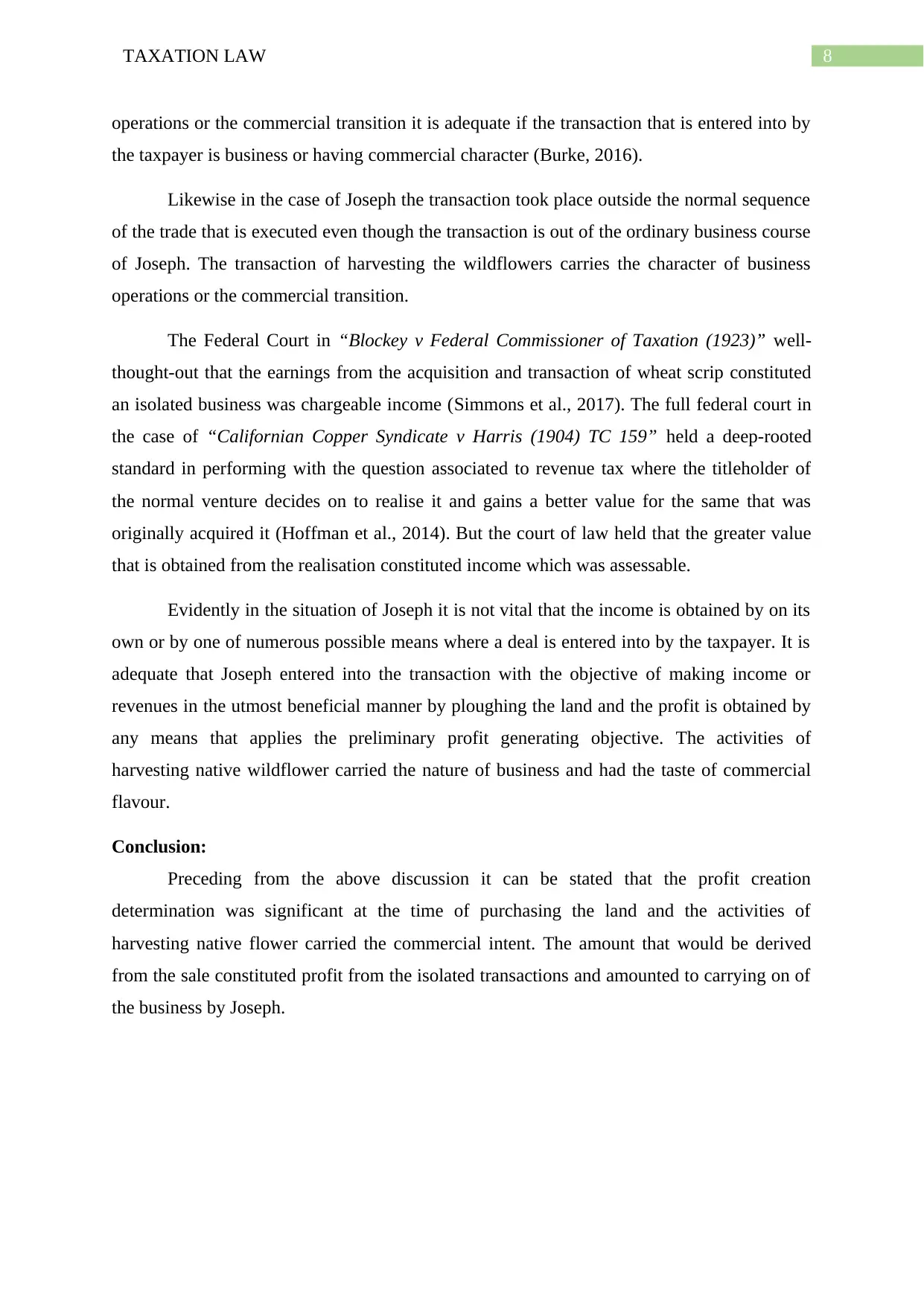
8TAXATION LAW
operations or the commercial transition it is adequate if the transaction that is entered into by
the taxpayer is business or having commercial character (Burke, 2016).
Likewise in the case of Joseph the transaction took place outside the normal sequence
of the trade that is executed even though the transaction is out of the ordinary business course
of Joseph. The transaction of harvesting the wildflowers carries the character of business
operations or the commercial transition.
The Federal Court in “Blockey v Federal Commissioner of Taxation (1923)” well-
thought-out that the earnings from the acquisition and transaction of wheat scrip constituted
an isolated business was chargeable income (Simmons et al., 2017). The full federal court in
the case of “Californian Copper Syndicate v Harris (1904) TC 159” held a deep-rooted
standard in performing with the question associated to revenue tax where the titleholder of
the normal venture decides on to realise it and gains a better value for the same that was
originally acquired it (Hoffman et al., 2014). But the court of law held that the greater value
that is obtained from the realisation constituted income which was assessable.
Evidently in the situation of Joseph it is not vital that the income is obtained by on its
own or by one of numerous possible means where a deal is entered into by the taxpayer. It is
adequate that Joseph entered into the transaction with the objective of making income or
revenues in the utmost beneficial manner by ploughing the land and the profit is obtained by
any means that applies the preliminary profit generating objective. The activities of
harvesting native wildflower carried the nature of business and had the taste of commercial
flavour.
Conclusion:
Preceding from the above discussion it can be stated that the profit creation
determination was significant at the time of purchasing the land and the activities of
harvesting native flower carried the commercial intent. The amount that would be derived
from the sale constituted profit from the isolated transactions and amounted to carrying on of
the business by Joseph.
operations or the commercial transition it is adequate if the transaction that is entered into by
the taxpayer is business or having commercial character (Burke, 2016).
Likewise in the case of Joseph the transaction took place outside the normal sequence
of the trade that is executed even though the transaction is out of the ordinary business course
of Joseph. The transaction of harvesting the wildflowers carries the character of business
operations or the commercial transition.
The Federal Court in “Blockey v Federal Commissioner of Taxation (1923)” well-
thought-out that the earnings from the acquisition and transaction of wheat scrip constituted
an isolated business was chargeable income (Simmons et al., 2017). The full federal court in
the case of “Californian Copper Syndicate v Harris (1904) TC 159” held a deep-rooted
standard in performing with the question associated to revenue tax where the titleholder of
the normal venture decides on to realise it and gains a better value for the same that was
originally acquired it (Hoffman et al., 2014). But the court of law held that the greater value
that is obtained from the realisation constituted income which was assessable.
Evidently in the situation of Joseph it is not vital that the income is obtained by on its
own or by one of numerous possible means where a deal is entered into by the taxpayer. It is
adequate that Joseph entered into the transaction with the objective of making income or
revenues in the utmost beneficial manner by ploughing the land and the profit is obtained by
any means that applies the preliminary profit generating objective. The activities of
harvesting native wildflower carried the nature of business and had the taste of commercial
flavour.
Conclusion:
Preceding from the above discussion it can be stated that the profit creation
determination was significant at the time of purchasing the land and the activities of
harvesting native flower carried the commercial intent. The amount that would be derived
from the sale constituted profit from the isolated transactions and amounted to carrying on of
the business by Joseph.
⊘ This is a preview!⊘
Do you want full access?
Subscribe today to unlock all pages.

Trusted by 1+ million students worldwide
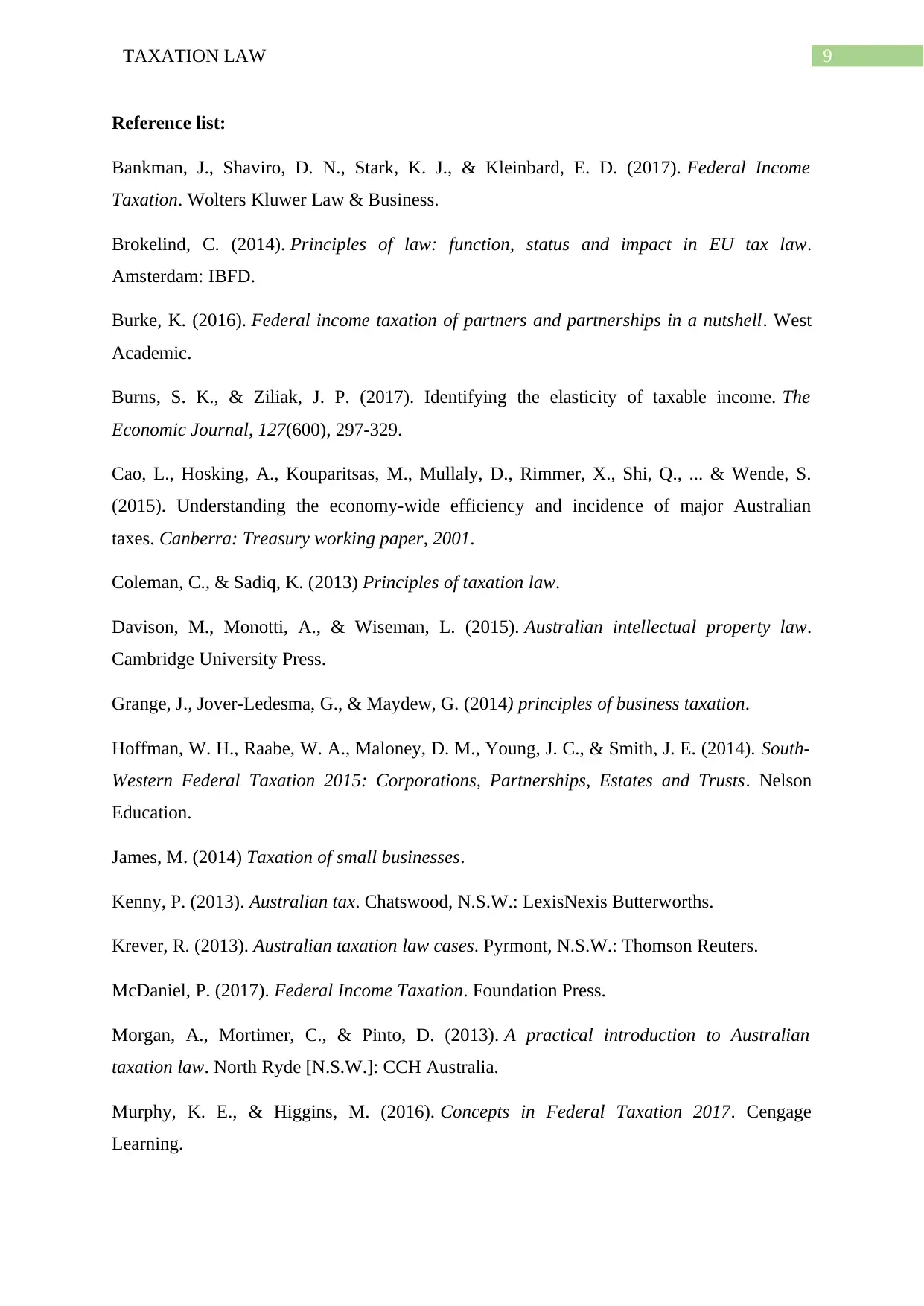
9TAXATION LAW
Reference list:
Bankman, J., Shaviro, D. N., Stark, K. J., & Kleinbard, E. D. (2017). Federal Income
Taxation. Wolters Kluwer Law & Business.
Brokelind, C. (2014). Principles of law: function, status and impact in EU tax law.
Amsterdam: IBFD.
Burke, K. (2016). Federal income taxation of partners and partnerships in a nutshell. West
Academic.
Burns, S. K., & Ziliak, J. P. (2017). Identifying the elasticity of taxable income. The
Economic Journal, 127(600), 297-329.
Cao, L., Hosking, A., Kouparitsas, M., Mullaly, D., Rimmer, X., Shi, Q., ... & Wende, S.
(2015). Understanding the economy-wide efficiency and incidence of major Australian
taxes. Canberra: Treasury working paper, 2001.
Coleman, C., & Sadiq, K. (2013) Principles of taxation law.
Davison, M., Monotti, A., & Wiseman, L. (2015). Australian intellectual property law.
Cambridge University Press.
Grange, J., Jover-Ledesma, G., & Maydew, G. (2014) principles of business taxation.
Hoffman, W. H., Raabe, W. A., Maloney, D. M., Young, J. C., & Smith, J. E. (2014). South-
Western Federal Taxation 2015: Corporations, Partnerships, Estates and Trusts. Nelson
Education.
James, M. (2014) Taxation of small businesses.
Kenny, P. (2013). Australian tax. Chatswood, N.S.W.: LexisNexis Butterworths.
Krever, R. (2013). Australian taxation law cases. Pyrmont, N.S.W.: Thomson Reuters.
McDaniel, P. (2017). Federal Income Taxation. Foundation Press.
Morgan, A., Mortimer, C., & Pinto, D. (2013). A practical introduction to Australian
taxation law. North Ryde [N.S.W.]: CCH Australia.
Murphy, K. E., & Higgins, M. (2016). Concepts in Federal Taxation 2017. Cengage
Learning.
Reference list:
Bankman, J., Shaviro, D. N., Stark, K. J., & Kleinbard, E. D. (2017). Federal Income
Taxation. Wolters Kluwer Law & Business.
Brokelind, C. (2014). Principles of law: function, status and impact in EU tax law.
Amsterdam: IBFD.
Burke, K. (2016). Federal income taxation of partners and partnerships in a nutshell. West
Academic.
Burns, S. K., & Ziliak, J. P. (2017). Identifying the elasticity of taxable income. The
Economic Journal, 127(600), 297-329.
Cao, L., Hosking, A., Kouparitsas, M., Mullaly, D., Rimmer, X., Shi, Q., ... & Wende, S.
(2015). Understanding the economy-wide efficiency and incidence of major Australian
taxes. Canberra: Treasury working paper, 2001.
Coleman, C., & Sadiq, K. (2013) Principles of taxation law.
Davison, M., Monotti, A., & Wiseman, L. (2015). Australian intellectual property law.
Cambridge University Press.
Grange, J., Jover-Ledesma, G., & Maydew, G. (2014) principles of business taxation.
Hoffman, W. H., Raabe, W. A., Maloney, D. M., Young, J. C., & Smith, J. E. (2014). South-
Western Federal Taxation 2015: Corporations, Partnerships, Estates and Trusts. Nelson
Education.
James, M. (2014) Taxation of small businesses.
Kenny, P. (2013). Australian tax. Chatswood, N.S.W.: LexisNexis Butterworths.
Krever, R. (2013). Australian taxation law cases. Pyrmont, N.S.W.: Thomson Reuters.
McDaniel, P. (2017). Federal Income Taxation. Foundation Press.
Morgan, A., Mortimer, C., & Pinto, D. (2013). A practical introduction to Australian
taxation law. North Ryde [N.S.W.]: CCH Australia.
Murphy, K. E., & Higgins, M. (2016). Concepts in Federal Taxation 2017. Cengage
Learning.
Paraphrase This Document
Need a fresh take? Get an instant paraphrase of this document with our AI Paraphraser
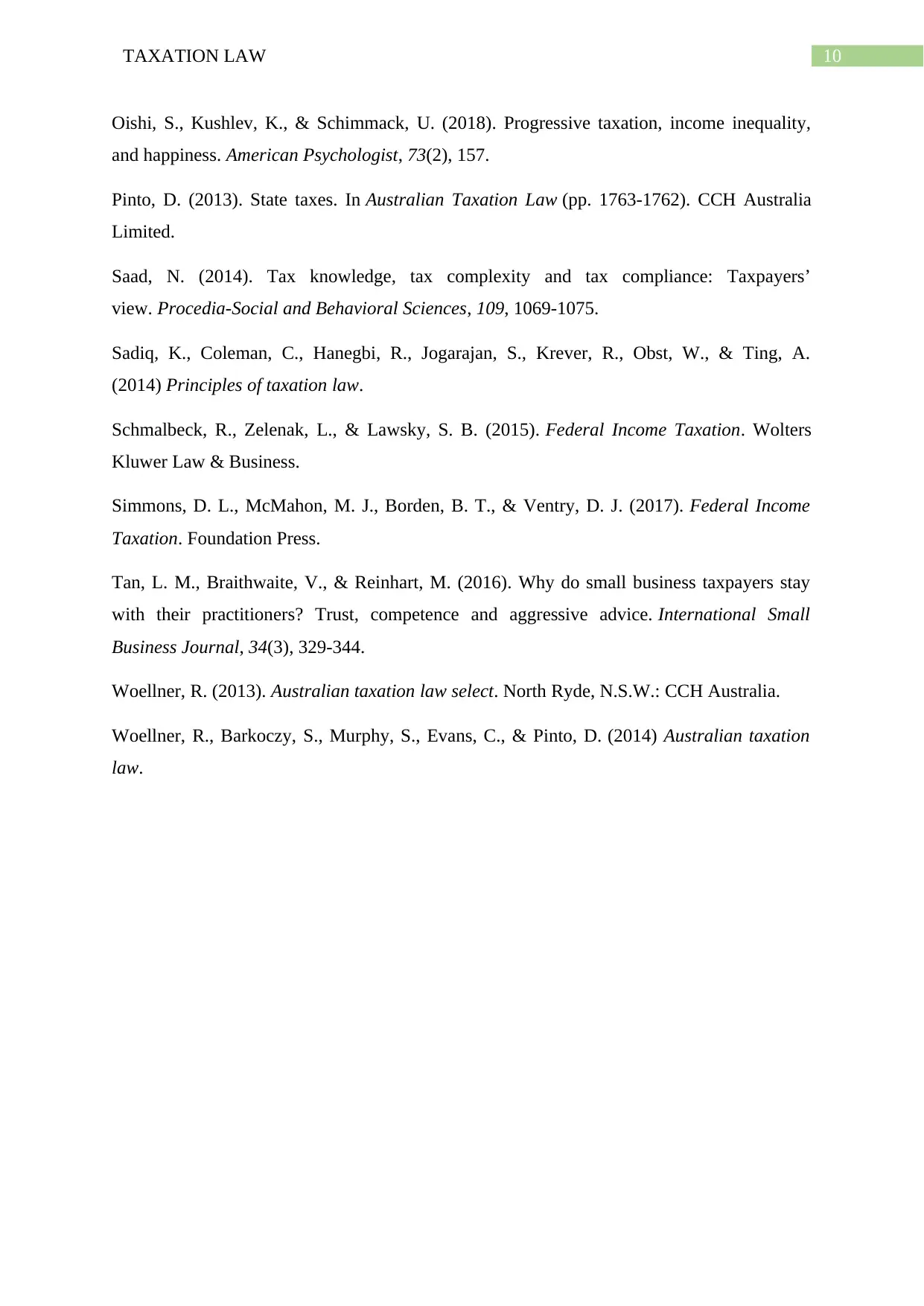
10TAXATION LAW
Oishi, S., Kushlev, K., & Schimmack, U. (2018). Progressive taxation, income inequality,
and happiness. American Psychologist, 73(2), 157.
Pinto, D. (2013). State taxes. In Australian Taxation Law (pp. 1763-1762). CCH Australia
Limited.
Saad, N. (2014). Tax knowledge, tax complexity and tax compliance: Taxpayers’
view. Procedia-Social and Behavioral Sciences, 109, 1069-1075.
Sadiq, K., Coleman, C., Hanegbi, R., Jogarajan, S., Krever, R., Obst, W., & Ting, A.
(2014) Principles of taxation law.
Schmalbeck, R., Zelenak, L., & Lawsky, S. B. (2015). Federal Income Taxation. Wolters
Kluwer Law & Business.
Simmons, D. L., McMahon, M. J., Borden, B. T., & Ventry, D. J. (2017). Federal Income
Taxation. Foundation Press.
Tan, L. M., Braithwaite, V., & Reinhart, M. (2016). Why do small business taxpayers stay
with their practitioners? Trust, competence and aggressive advice. International Small
Business Journal, 34(3), 329-344.
Woellner, R. (2013). Australian taxation law select. North Ryde, N.S.W.: CCH Australia.
Woellner, R., Barkoczy, S., Murphy, S., Evans, C., & Pinto, D. (2014) Australian taxation
law.
Oishi, S., Kushlev, K., & Schimmack, U. (2018). Progressive taxation, income inequality,
and happiness. American Psychologist, 73(2), 157.
Pinto, D. (2013). State taxes. In Australian Taxation Law (pp. 1763-1762). CCH Australia
Limited.
Saad, N. (2014). Tax knowledge, tax complexity and tax compliance: Taxpayers’
view. Procedia-Social and Behavioral Sciences, 109, 1069-1075.
Sadiq, K., Coleman, C., Hanegbi, R., Jogarajan, S., Krever, R., Obst, W., & Ting, A.
(2014) Principles of taxation law.
Schmalbeck, R., Zelenak, L., & Lawsky, S. B. (2015). Federal Income Taxation. Wolters
Kluwer Law & Business.
Simmons, D. L., McMahon, M. J., Borden, B. T., & Ventry, D. J. (2017). Federal Income
Taxation. Foundation Press.
Tan, L. M., Braithwaite, V., & Reinhart, M. (2016). Why do small business taxpayers stay
with their practitioners? Trust, competence and aggressive advice. International Small
Business Journal, 34(3), 329-344.
Woellner, R. (2013). Australian taxation law select. North Ryde, N.S.W.: CCH Australia.
Woellner, R., Barkoczy, S., Murphy, S., Evans, C., & Pinto, D. (2014) Australian taxation
law.
1 out of 11
Related Documents
Your All-in-One AI-Powered Toolkit for Academic Success.
+13062052269
info@desklib.com
Available 24*7 on WhatsApp / Email
![[object Object]](/_next/static/media/star-bottom.7253800d.svg)
Unlock your academic potential
Copyright © 2020–2026 A2Z Services. All Rights Reserved. Developed and managed by ZUCOL.




